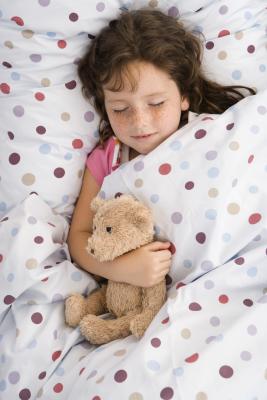Children with autism are more likely to suffer from sleep disorders than neurotypical children. According to WebMD, 40 to 80 percent of children with autism have difficulty falling asleep, poor sleep quality or early waking times. Poor sleep can lead to increased behavioral difficulties, poor learning performance, irritability, depression and aggression. Helping your child sleep well can allow him to reach his full potential and help you to get the rest you critically need to parent him.
Step 1
Create a comfortable and quiet environment for sleep. Install thick rugs or carpeting to reduce noise and heavy curtains to keep her room dark. Use a fan or white noise machine to reduce distractions at bedtime. Offer your child a bed tent if he likes confined spaces.
Step 2
Eliminate stimulants and stimulating activities several hours before bedtime. Avoid caffeine and sugar consumption in the evening and turn off the television, computer or video games.
Step 3
Develop a bedtime routine that soothes and calms your child. Include sensory activities, like a warm bath, if appropriate. Read a story or listen to an audiobook together, give her a back rub or listen to soft music. Repeat the same routine every night.
Step 4
Make a written or picture schedule of your bedtime routine, including stories, snacks, bath time and brushing his teeth. Clear visual reminders can help a child with autism know what to expect and reduce stress.
Step 5
Speak to your health care provider about supplements like melatonin or medications to help your child sleep if good sleep routines and a comfortable sleeping space do not alleviate his sleep difficulties.





